LIQUEFIED NATURAL GAS (STILL) LOVES GREENWASHING
15.10.2025
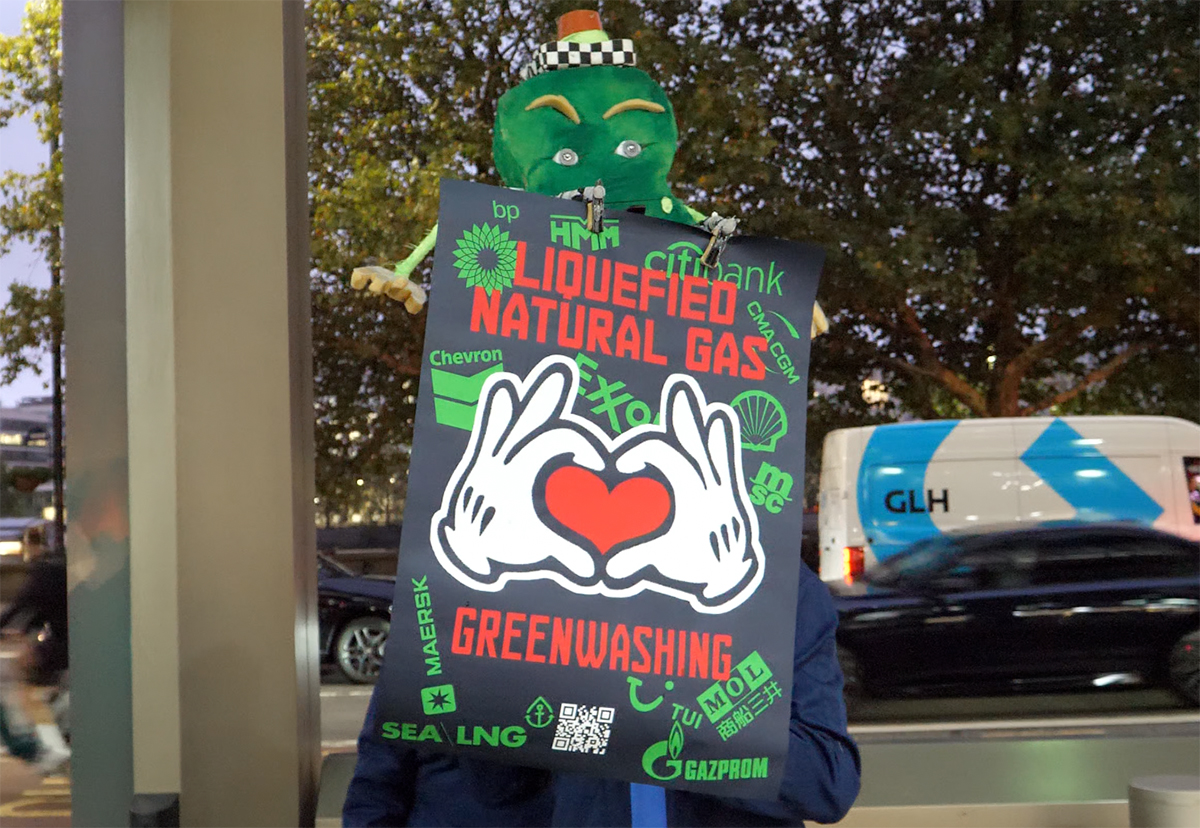
⬆️ Scrubby gets ready to paste posters to the windows of the UN IMO.
—
The UN International Maritime Organisation (IMO) 2nd Extraordinary Session is meeting this week. It is a meeting where IMO delegates and Member States will be finalising plans to regulate shipping pollution.
To mark this special occasion we thought we’d remind them that not all shipping emissions are treated equally. In fact some might not be considered at all. Last week Shell announced plans to extract more liquefied natural gas – the fuel the oil, gas and shipping industry is lobbying to be exempt from IMO shipping pollution regulations.
⬆️ Window redecoration is go!
—

⬆️ Why are there posters on the window? It’s to remind UN IMO Member States and delegates that all fossil fuels should be treated equally. After all ‘Liquefied Natural Gas ❤️ Greenwashing’ only when LNG escapes planned shipping pollution regulations.
—

⬆️ Here comes Scrubby with another poster.
—
The fate of the Ocean depends on us all.
Our interventions depend on your support.
At 18:00hrs, while delegates were enjoying canapés and sipping wine, a ‘Scrubby the greenwashing Sponge’ appeared at the window of their reception holding a poster. A poster containing the graphic message ‘LIQUEFIED NATURAL GAS LOVES GREENWASHING’. The precarious Scrubby, operating on a long 4 metre pole, pasted the poster onto the window, giving everyone inside the opportunity to applaud its wonderful skills. It then bobbed down to the ground to pick up another poster to repeat the process until the IMO windows were obscured.
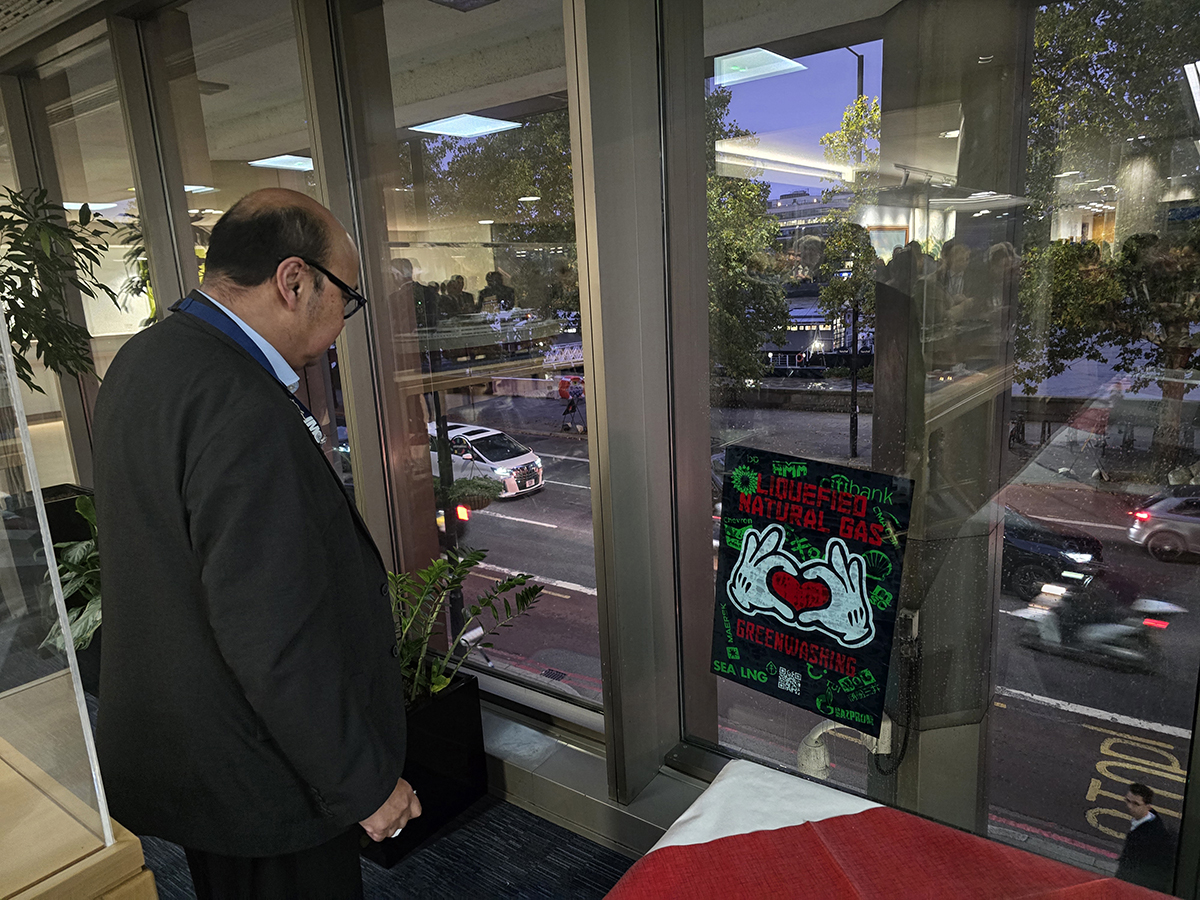
⬆️ Time to take a closer look at who has been greenwashing LNG. You don’t have to look far, the membership of SEA/LNG provides a full list of scoundrels. Oil and Gas can’t be a part of ‘The Future of Shipping’. If the UN IMO is serious about reducing pollution shipping must stop using fossil fuels.
—
Scrubby represents the blatant greenwashing that will give LNG a free pass to avoid any MEPC plans to include LNG in shipping pollution regulations / tax levies – making LNG the go to fossil fuel for shipping (while still accelerating dangerous emissions and obscene profits for the fossil fuel and shipping industries). ‘Scrubby the greenwashing Sponge’ was keen to make sure ‘The Future of Shipping’ message on behalf of SEALNG.ORG was seen by all IMO Delegates and Member States.
After all Scrubby didn’t want its employers, the fossil fuel and shipping industries, to miss out on a chance to greenwash LNG ahead of the MEPC discussions on shipping fuel levies (which companies like CMA CGM and Exxon Mobil as well as classification societies like DNV and ABS hope LNG can avoid by selling itself as the ‘green’ fuel it certainly isn’t).
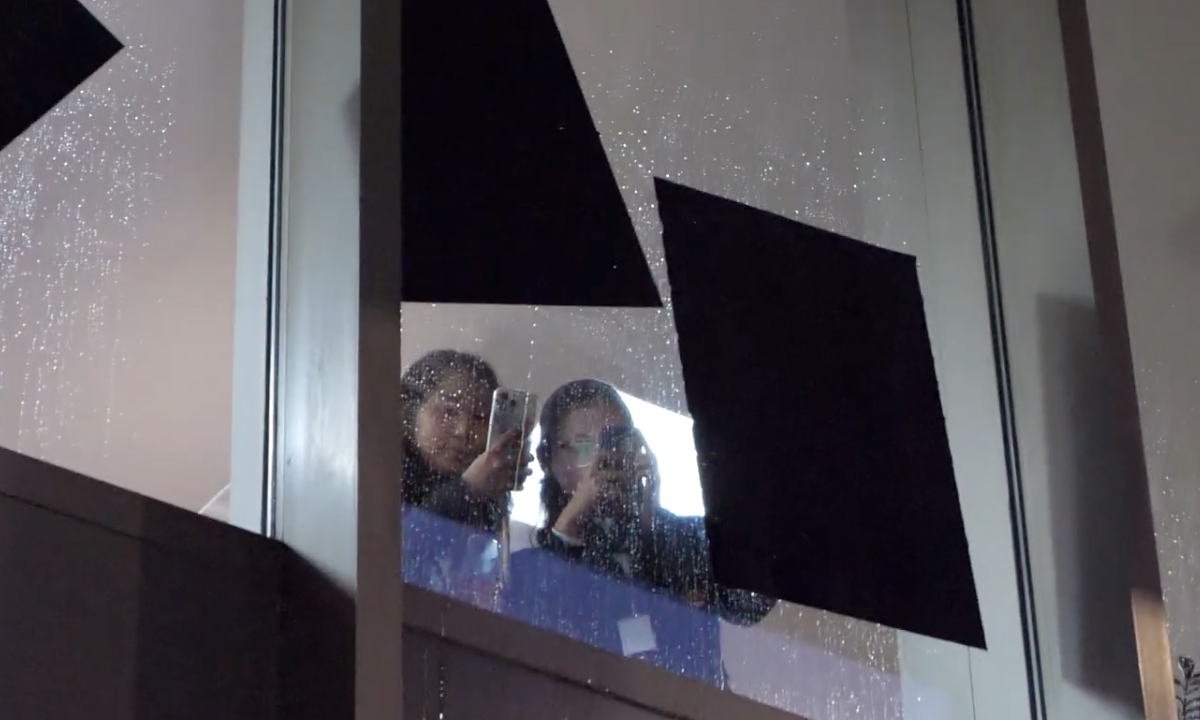
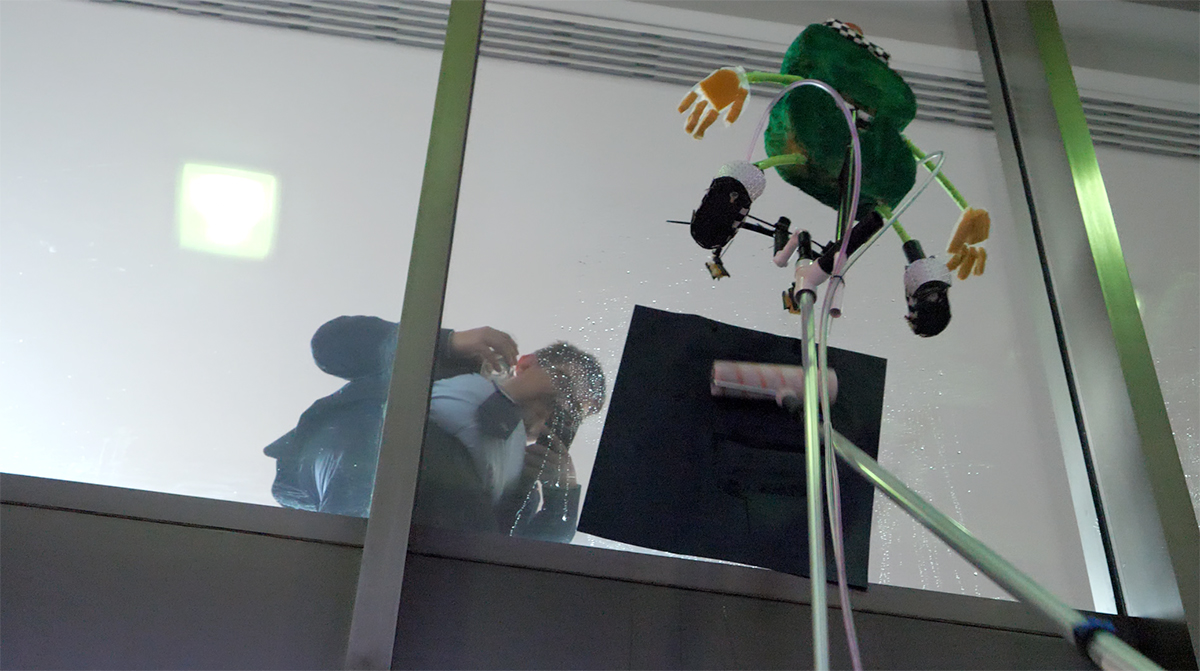
⬆️ Delegates take photos of the posters.
—
The performance celebrates the rampant puppetry at large in MEPC meetings. Meetings dominated by the interests of the shipping industry, an industry intent on cementing its romance with the oil and gas industry by adopting dirty LNG as its fuel of choice. This is despite recent research which has exposed the lies of industrial lobbying platforms like SEA/LNG. The peer reviewed research reveals that LNG extracted and exported from the US is 33% more polluting than coal, vying for the title of most lethal of the fossil fuels. Methane leaks occur throughout the LNG extraction and supply process increasing mortality levels and causing health problems. And LNG extraction destroys land and coastal communities wherever an LNG plant appears. These same leaks continue onboard LNG powered vessels, helping accelerate climate collapse and the collapse of our economies. To cover up this uncomfortable truth the industry trumpets ‘biomethane’ and ‘e-methane’ products that are only 6% of the EU market and even less worldwide (and both still leak methane throughout their supply chains and, in the case of biomethane, use up land resources and bump up food scarcity and prices). The industrial scale of LNG greenwashing has converted the UN IMO MEPC into a puppet for the oil and gas industry.

⬆️ “This is private land, please leave now!!!”
“I’ll try sir, but please be careful on the wet floor, it’s rather slippy.”
“Just leave, get off this land, you are committing soft trespass.”
“I will if you remove the barrier, my hip’s not so good and I can’t get over it…”
—
Liquefied Natural Gas (LNG) – the facts
LNG is a fossil fuel that, when extracted, transported and burnt as a marine fuel, leaks methane into the atmosphere – a dangerous global-warming gas that is over 80-times more climate-warming in the short-term (20 years) than carbon dioxide.
The UN’s Intergovernmental Panel on Climate Change (IPCC) identified rapid methane emission cuts as one of the top priorities in order to limit global warming to as close to 1.5°C as possible. The IPCC’s latest report focusing on climate mitigation makes clear that fossil gas in the form of LNG is not a solution for shipping’s decarbonisation.
Contrary to what climate science requires, shipping and port companies have been going full steam astern, investing heavily in fossil LNG, alleging that the fuel will reduce their environmental impacts and climate pollution. There are currently over 785 new cargo ships on order globally, with over 400 being built to run on dirty fossil LNG.
Burning more fossil LNG onboard vessels is a disaster in the making for our planet. It would only increase methane emissions from ships, which already rose by 180% between 2016 and 2023, according to a recent International Council on Clean Transport (ICCT) report.
Methane emissions also decrease air quality. Additionally, increased demand for LNG—including in the marine sector—leads to adverse land-based impacts, such as polluted drinking water, reduction in crop production, and higher premature death rates.

⬆️ Regulating shipping pollution is hungry work, unfortunately the canapés didn’t find their way outdoors.
—
We Need Strong Methane Regulations at the IMO
According to the IPCC (AR6), addressing the climate emergency and its devastating impacts on people requires urgently tackling methane emissions in the near term. LNG proponents are gaslighting policymakers about the real size of the climate and health impacts of LNG while jeopardising a survivable future on this planet.
The International Maritime Organization (IMO) is the United Nations body regulating international shipping. Currently, no specific international regulations exist for methane emissions from ships. However, several opportunities exist to comprehensively integrate methane into the IMO’s regulatory framework during the Marine Environmental Protection Committee (MEPC82). If this doesn’t happen we propose a more drastic future for the IMO.
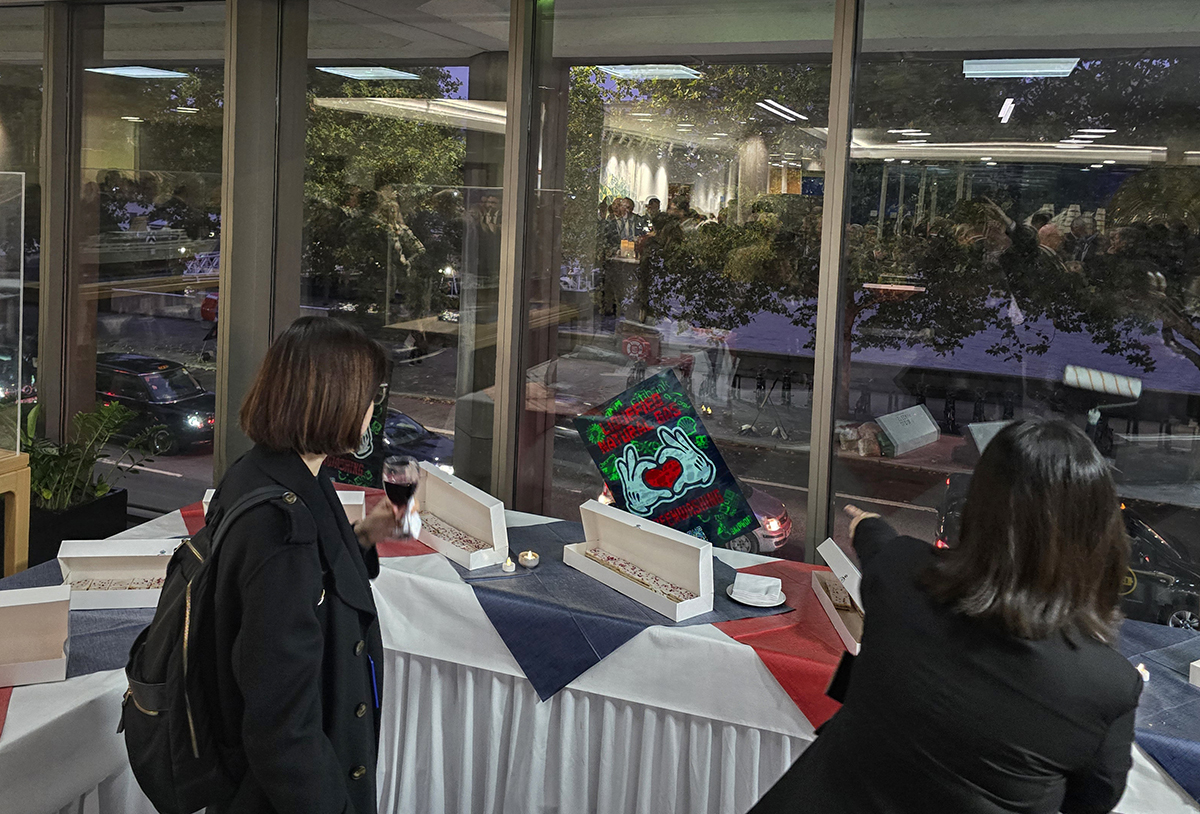
⬆️ “Look at that poster the puppet stuck to the window!”
“Does it mean we’re complicit in greenwashing?”
Yes is it does, and so is the UN IMO if it doesn’t regulate methane (the leaky byproduct of LNG) along with other fossil fuels.
—
Call for action at the IMO:
LNG is a fossil fuel that negatively impacts people, the environment, and the climate at every stage of its life cycle.
We demand:
1. Methane emissions are considered as a greenhouse gas and included in any MEPC plans to levy a carbon tax on shipping, weighted by fugitive methane’s excess climate forcing capacity.
2. The Member States of the IMO recognise LNG as a fossil fuel and stop being misled by the SEA LNG lobbyists, locking them out of the IMO instead.
3. The IMO to promote efficiency and the use of slow steaming, capacity reduction and sail and electrically powered vessels by incentivising uptake in the shipping sector, empowering and upskilling workers and introducing fairer shipping routes.
If the IMO does not act Ocean Rebellion demands:
The UN must form a new, transparent, and representative body to govern the Ocean for the benefit of ALL life. This new body must have the restoration and replenishment of the Ocean on which all our lives depend as its only measure of success. It should replace corporate power with people power. And it should represent the many forms of marine life who actually make the ocean a home.
—
Photos by S. Staines.